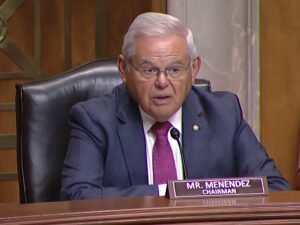 Senate Foreign Relations Committee Chairman Robert Menendez (D-NJ)
Senate Foreign Relations Committee Chairman Robert Menendez (D-NJ)
WASHINGTON, D.C. –Under intense grilling today by the U.S. Senate Foreign Relations Committee, a mid-level Biden-Harris administration aide repeatedly dodged direct questions about the State Department’s failure to break Azerbaijan’s genocidal blockade of Artsakh – even refusing, on national security grounds, to answer Chairman Robert Menendez’s (D-NJ) straightforward query about Azerbaijani President Ilham Aliyev’s motives for starving 120,000 indigenous Christian Armenians, reported the Armenian National Committee of America (ANCA).
Thursday’s hearing, titled “Assessing the Crisis in Nagorno-Karabakh,” was chaired by Sen. Menendez (D-NJ) and featured testimony by Acting Assistant Secretary for Europe and Eurasia Yuri Kim. The chair led members of the committee in direct, often confrontational questioning of the State Department refusal to hold Azerbaijan accountable or to provide urgently needed humanitarian aid to Artsakh.
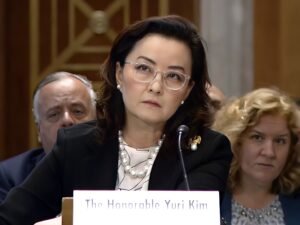 Acting Assistant Secretary of State for Europe and Eurasia Yuri Kim
Acting Assistant Secretary of State for Europe and Eurasia Yuri Kim
“The signature moment – the defining exchange – of today’s Senate Foreign Relations Committee Artsakh hearing was Acting Assistant Secretary Yuri Kim hiding behind a transparently slippery appeal to state secrets to avoid answering a straightforward question about Aliyev’s obvious motives for blockading Artsakh,” stated ANCA Executive Director Aram Hamparian. “The Armenian American community joins Chairman Menendez in demanding answers about the State Department’s refusal to forcefully confront Azerbaijan’s genocidal ethnic cleansing of Artsakh.”
Chairman Menendez was emphatic about the urgency of the situation in Artsakh, stating, “As we sit here today with the lives of so many people hanging in the balance, time is of the essence. The former prosecutor at the International Criminal Court, Luis Moreno Ocampo, recently wrote, ‘Starvation is the invisible genocide weapon. Without immediate dramatic change, this group of Armenians will be destroyed in a few weeks.’ That is how long we have. I would ask our witness to speak to what the [State] Department is doing, what the Biden administration is doing, and what the international community must do to avert this atrocity from being carried out before our own eyes.”
Acting Assistant Secretary Kim held to standard State Department refrains regarding the deteriorating situation in Artsakh. “I want to be clear that we view the status quo as completely unacceptable,” stated Acting Assistant Secretary Kim, who went on to urge the immediate opening of the Berdzor (Lachin) Corridor while also supporting Azerbaijan’s calls for the opening of additional routes that could undermine Artsakh’s security.
She praised Secretary Blinken’s Azerbaijan-Armenia mediation efforts, held under duress during Azerbaijan’s genocidal blockade. “Secretary Blinken has hosted three rounds of peace negotiations with the foreign ministers of Armenia and Azerbaijan since last November, and his leadership has yielded results. The sides have made progress on a peace agreement that could stabilize the region.”
She concluded her prepared remarks, noting: “The United States will not countenance any effort or action, short-term or long-term, to ethnically cleanse or commit other atrocities against the Armenian people of Nagorno-Karabakh.”
However, when asked by Senator Menendez “why the United States is not or cannot do more to get humanitarian assistance [to Artsakh],” the Acting Assistant Secretary of State pointed to the passage of a single Russian Red Cross truck through the secondary Aghdam road to Artsakh, noting “that traffic is now flowing,” though she agreed with Senate leaders, “it is not enough.”
When asked by Senator Menendez, “Why do you think, despite its signed commitments and a ruling by the International Court of Justice to open the Lachin Corridor, that Aliyev is not opening the corridor?”, Acting Assistant Secretary Kim refused to answer publicly, inferring the matter is classified.
An “amazed” and clearly disappointed Senator Menendez offered his own answer. “He [President Aliyev] doesn’t want to open the corridor because he is in the process of trying to subjugate these people by starvation, or by the threat of starvation, and at the end of the day subject them to his will. That doesn’t have to be classified.”
Senators reissue calls for enforcing Section 907 restrictions on U.S. assistance to Azerbaijan; express concerns about U.S.-Azerbaijan relationship
Chairman Menendez was joined by Senator Benjamin Cardin (D-MD) and Chris Van Hollen (D-MD) in pressing the State Department to enforce Section 907 restrictions on U.S. military assistance to Azerbaijan.
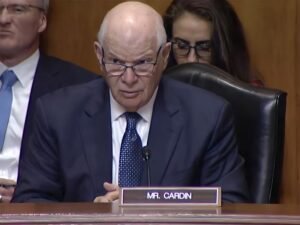 Sen. Ben Cardin (D-MD)
Sen. Ben Cardin (D-MD)
“I have repeatedly expressed my deep opposition to waiving Section 907 of the Freedom Support Act, allowing the United States to send assistance to his regime. This clearly alters the balance of military power between Azerbaijan and Armenia in Aliyev’s favor. I think Azerbaijan’s actions over the past three years have vindicated my skepticism,” stated Chairman Menendez.
“When you routinely give the waiver under Section 907, saying that Azerbaijan has demonstrated steps to cease all blockades and other offensive uses of force against Armenia when that’s just not the case,” stated Sen. Cardin, “we lose credibility when that happens, when we aren’t prepared to take decisive steps based upon our values.”
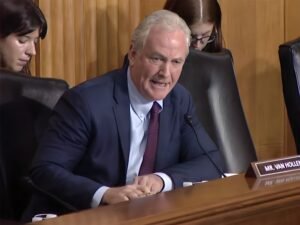 Sen. Chris Van Hollen (D-MD)
Sen. Chris Van Hollen (D-MD)
Senator Van Hollen stressed that the waiver of Section 907 should not only be based on national security considerations, but as the law states, the impact of the waiver on the Azerbaijan-Armenia peace process. “Based on your statements from April, the State Department’s statements from April, it’s pretty clear that at least as of then, in your own words, in the State Department’s own words, it was undermining confidence in the peace process. And I don’t see anything that’s changed from that day to this.”
Acting Assistant Secretary Kim defended previous waivers of Section 907, noting that assistance has been used for counter-terrorism and other purposes. She confirmed that President Biden’s 2022 waiver had expired in June. “We have not submitted a new waiver request yet because we are reviewing the situation very carefully,” stated Acting Assistant Secretary Kim.
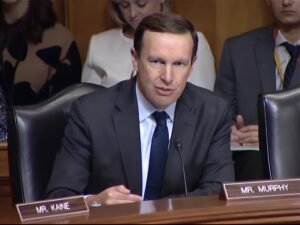 Sen. Chris Murphy (D-CT)
Sen. Chris Murphy (D-CT)
Senator Chris Murphy (D-CT) was skeptical of the State Department’s effectiveness in addressing the Artsakh crisis. “This is obviously a crisis, an active difficult, question regarding the pressure points on Azerbaijan, but at this point I think you have to put all possible tools on the table because gentle diplomacy does not seem to be working,” stated Senator Murphy. He also commented on Azerbaijan’s growing ties with Russia in the energy sector and asked, “So what are the implications for the U.S. and for Europe as Azerbaijan and Russia draw closer; what is the nature of that relationship, and did we make the wrong bet?”
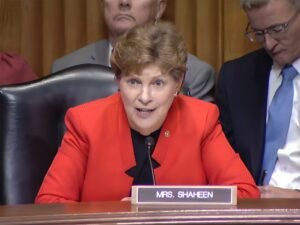 Sen. Jeanne Shaheen (D-NH)
Sen. Jeanne Shaheen (D-NH)
Senator Jeanne Shaheen (D-NH) noted that she shares “the concerns that have been expressed about Azerbaijan’s continued obstruction of the Lachin Corridor. In New Hampshire, we have a large Armenian diaspora, and we hear consistently from them about their concerns that Azerbaijan’s blockade has resulted in severe humanitarian suffering, that it should be lifted immediately.”
Other Senators participating in the hearing included Senate Foreign Relations Committee Ranking Member James Risch (R-ID) and Senators Pete Ricketts (R-NE) and Tim Kaine (D-VA).
